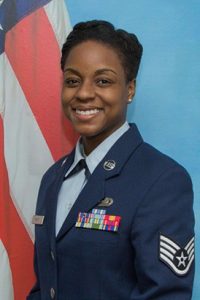
Tanesia Woody says she’s stubborn. As she tells it, she only decided to become a cryptologic language analyst for the Air Force after the recruiter suggested that she shouldn’t try because roughly 50 percent of prospective linguists fail out of the program.
“When he told me it was the program most people failed out of, I said ‘Cool, sign me up,’” Woody recalled.
Woody served formally in the Air Force for six years, and though she medically retired in January, she continues to serve the nation in a similar capacity as civilian organizational consultant for the Department of Defense.
In her still young career, she has earned more than a dozen honors and awards including the Joint Service Achievement Medal in 2017 and the Presidential Volunteer Service Award in 2016.
“I don’t exaggerate when I say that she’s a once-in-a-career type individual,” said Lieutenant Colonel Scott Paul, her Air Force supervisor. “Her ability to do her job instantly stood out from among her peers, and her dedication, her commitment, and her drive to have things almost obsessively perfect stood out to me right away. I’ve never met someone like her in my 18 years.”
As a language analyst living in Anchorage, Alaska, Woody is proficient in Spanish, Russian, and Ukranian. Though Woody can’t talk about her work because it is almost entirely classified, Lieutenant Colonel Paul said that her work was critical for national security.
“The impact of the work that she did spanned the entire scope of strategic importance and tactical importance,” Paul said. “There were things that were important to the war fighter, and there were other things that went to presidential daily briefings, which is a big deal in the intelligence community.”
Overall, Woody says she loves her job because it’s bigger than her.
“I know that seems a bit simple,” she said. “But I think that’s what counts—doing something that extends beyond ourselves.